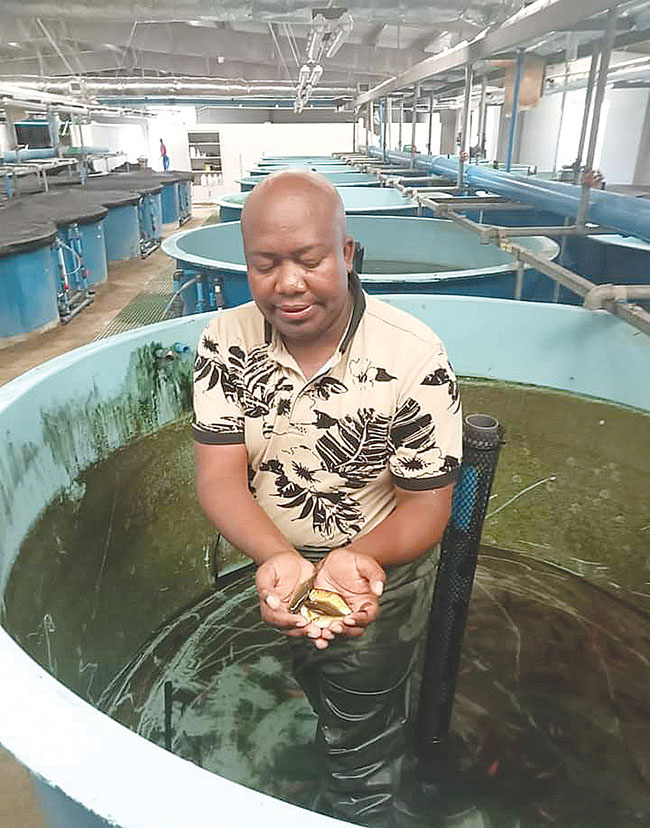
News & Views
Rising costs killing small-scale aquaculture in South Africa
June 13, 2024 By Bob Atwiine
 Morena Khashane holding fingerlings from one of the water tanks inside his fish farm
Photo: Morena Khashane
Morena Khashane holding fingerlings from one of the water tanks inside his fish farm
Photo: Morena Khashane Small-scale fish farmers in South Africa continue to battle the problems of an unabated rise in the cost of production and unstable energy supply due to constant power load shedding.
This time, small-scale fish farmers are shouting that many operators are closing shops in an apparent surrender to the inclement operating conditions, a development they fear may worsen the current unemployment situation in South Africa.
Morena Khashane is a South African small-scale fish farmer from the small town of Port Alfred in Eastern Cape Province, who developed a passion and interest in the aquaculture sector at a tender age. He wanted to create employment for his fellow young people as a youth coordinator in his native hometown.
Khashane was then taken to Cape Town by his area’s Member of Parliament for intensive training and killing in fish farming. Subsequently, he established MK Enterprise (Pty) Ltd. to farm Nile tilapia (Oreochromis niloticus) in 2005 in recirculating water systems together with a group of other young partners.
However, Khashane’s dream of feeding his people on sustainably farmed tilapia and job creation is now shuttered. Just like hundreds of fellow small-scale fish farmers in the country, he has hung up the nets, a painful decision he had to make because business is no longer sustainable.
“The reason why the cost of production in South Africa has become unbearable is because of the issue of water. Because, for example, Nile tilapia takes about six to eight months to reach the maximum size under the room temperature of 28 degrees celsius. Here in South Africa, it is very impossible to get that temperature in eight months. The only option available is to heat the water using energy and that automatically increases the cost of production in order to produce a desirable mature tilapia,” says Khashane.
He further explains that many farmers in South African farms use recirculating aquaculture system (RAS) which consumes a lot of energy because of using generators to run the systems due to unstable power supply.
“Unfortunately, in South Africa, now we are disturbed by electricity load shedding since last year and that means that if you are using RAS, the plant must run 24 hours which will require a backup generator,” he explained.
Khashane added that on his former farm, he has been depending on a diesel generator to run RAS system, thus shooting up his production costs which has become unbearable for him in the long run.
He also disclosed that the high cost of fish feeds has had their prices above normal. This has been principally responsible for the high cost of production and the higher cost of fish on the market.
“The fish feeds are also very expensive; a kilogram now is between 18-20 South African Rands from 15-16 Rands previously. These factors among others increase our cost of production. At the end of last year most of the small-scale fish farmers closed down because it was very difficult to sustain the business under this situation. The few who are still struggling are operating below their original operational capacity,” he said.
Small-scale farmers and fishers in South Africa have long faced many obstacles, with the fishing industry established amidst discriminatory policies that favour large-scale, commercial farmers. These farmers are often off the radar for policymakers, and their social, and economic situation like this puts a serious threat to the livelihoods of these farmers that provide food for millions of people.
According to Khashane, the South African government is working on a new bill on aquaculture which is yet to be tabled before parliament for discussion and passing later this year after elections which he hopes will assist small-scale fish farmers in the country.
“The Chinese large-scale fish farmers and importers are also a big challenge because they have too much capital and bring in cheap frozen imported fish. Our small-scale farmers cannot compete with them due to insufficient funds to invest. Small-scale fish farming especially in tilapia can no longer work in South Africa. We have given up,” Khashane said.
The youngest fisheries award winner 2018/2019 after closing business has enrolled for MSc in Sustainable Aquaculture at University of St Andrews in the United Kingdom, after scooping a Commonwealth Scholarship to further his studies.
Khashane hopes that once he completes his studies, he will be able to develop more knowledge and skills needed to develop aquaculture in South Africa to become economically viable and train more young people.
Print this page





